Women’s cyclists are some of the most dedicated and committed athletes on earth. Driven by determination and love of the sport, they push on, racing for glory.
We will be discussing six n incredible women who showed amazing skill and determination in the sport of competitive cycling.
Here is a list of the top six best women’s cyclists of all time.
1. Marianne Vos

- Two-time Olympic gold medalist (1 road and 1 track)
- Three-time winner of the world championship road race
- Seven-time winner of the world cyclocross championship
- Five-time winner of the UCI Women’s Road World Cup
“The world’s best bike racer is a woman,” Outside Magazine declared in a recent profile. And perhaps it is true: Marianne Vos, a Dutchwoman of 31 who could conceivably race for several more years, received more votes in our survey than any other women’s cyclist, racing or retired, living, or dead.
Growing up in ‘s-Hertogenbosch, Netherlands, she was an active child, speed skating and training for road cycling with her brother who was already racing. As a teenager, she added cyclo-cross and mountain biking, winning the Dutch Junior Mountain Biking Championship three years in a row and the Junior Road World Championship in 2004. Once Vos moved to senior World Cup races, she quickly achieved World Championships in road and cyclo-Cross disciplines.
In 2008, she started track racing, winning a World Championship and an Olympic gold medal in the same year. Vos continues to dominate, holding an incredible eight World Championship titles in cyclo-Cross. She is the first woman to win a World Championship in road racing, track cycling, and cyclo-cross; and she holds an Olympic gold in both road and track.
She currently rides for a team whose name, CCC-Liv, reads like the Roman numeral for 350. And that figure is not much higher than the number of races that Vos has won. Her victories have come in four wildly different disciplines, road racing, track racing, mountain biking, and cyclocross. No man has even approached this kind of dominance in four different cycling disciplines.
It’s safe to say that Marianne Vos has mastered riding the bicycle to a perfect and precise art form. She is a top-notch cyclist and a champion that should be watched closely by cycling fans.
2. Beryl Burton
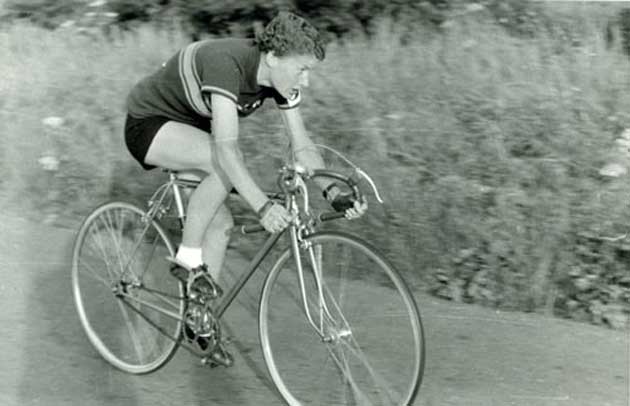
Female cyclist who won 96 national titles in England
A cyclist without limits, capable of constantly breaking records and managing to hold a title for several years. Britishwoman Beryl Burton was the best female cyclist in the UK for almost 25 years.
A favorite Beryl Burton anecdote (and there are many) comes from 1967 when she set a new record for both women and men in the 12-hour time trial, an event as grueling as it sounds. Burton started out behind 99 men and proceeded to pass them all. The last was Mike McNamara, who was on his way to breaking the men’s record. As she passed him, Burton offered him a licorice drop in consolation.
Burton claimed 96 national titles in her native England over a 30-year career, including 25 consecutive time trial championships in four different decades. She won seven world championships in the 1950s and 1960s, five in the individual pursuit, two in the road race. Her dominance could extend no further; there were no Olympics for women cyclists in that era, no grand tours or epic stage races.
Through it all, Burton doubled as a Yorkshire housewife and mother, a part-time cycling star without sponsorship or a proper coach. Perhaps that is why she had no real sense of tactics; Burton routinely lost world championship road races to other women she had towed to the line.
“So much of what Beryl achieved and stood for was before her time,” said Lizzie Deignan, a contemporary British champion. “Taking on the men, riding through pregnancy, returning to competition after having her daughter — she greatly inspired me.”
3. Jeannie Longo
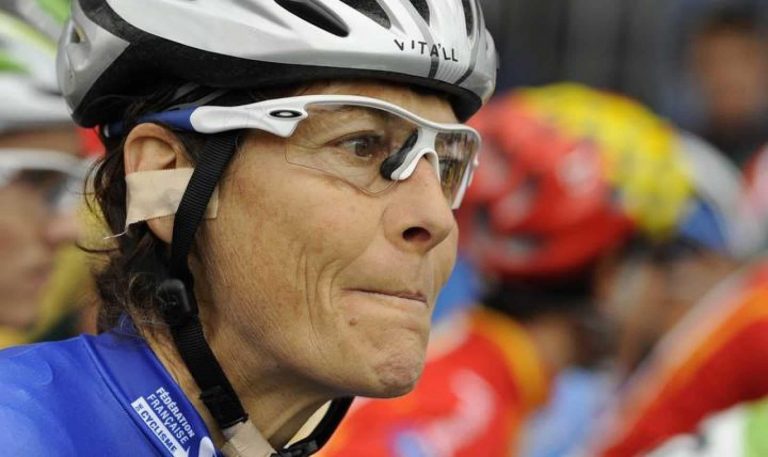
Female cyclist who won more than 1000 cycling races
Jeannine Longo was seemingly unstoppable during her career. So much so that even casual fans of competitive cycling were familiar with the respected legend. Over the course of her career, Longo won more than 1000 races, stretching from the late 1970s to the early 2000s. In that time, she won 13 world titles in numerous disciplines.
She may well be the greatest female cyclist of her era, but now there is a discomfiting sense that no one will ever really know how good she was.
Her husband and coach, Patrice Ciprelli, was convicted for illegal importation of EPO, cycling’s infamous wonder drug, a blood booster capable of elevating a middling cyclist into a champion. The widespread assumption is that some of that EPO found its way to Longo, although she herself failed only one drug test, in 1987, for the stimulant ephedrine.
Longo won more than 1,000 races during an unfathomably long career. She started racing in 1979. She won her first French national championship that year. Thirty-two years later, at the absurd age of 52, she won her 59th and final French title. By then, many competitors were young enough to be her daughters. She never really retired.
She was the sort of racer so dominant that other racers, great ones, would curse the sad fate that their peak years coincided with hers. She won 13 world titles in various disciplines, including four consecutive world-championship road races in the late 1980s and a fifth in 1995, a record total. She won three consecutive editions of the women’s Tour de France. She broke 38 cycling records and claimed four Olympic medals, one of them gold.
“You take that kind of talent and then add the mania of dedication and the loner personality, and you have an athlete who’s far and above,” said Kendra Wenzel, a retired American cycling star. “You take away the dope, and I think you’d still have an athlete like Longo dominating.”
4. Fabiana Luperini
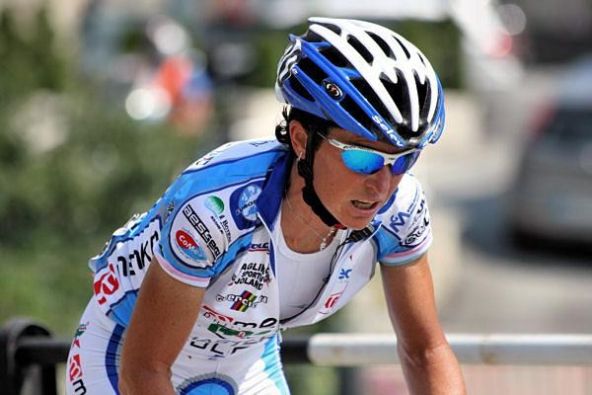
- Five-time Giro Rosa Champion
- Three-time Grande Boucle Feminine Champion
- Italian National Road Race Champion
- Rode for Gas Sport Team, Edil Savino, Tean 2002 Aurora RSM, Team Let’s Go, A.S. Team FRW, Top Girls Fassa Bortolo Raxy Line, Menikini, MCipollini-Giambenini, Faren-Honda, and Faren-Kuota
Italian cyclist Fabiana Luperini is the only rider to win the Giro d’ltalia Femminile fve times. One of the best cyclists of the modern era, she was known for her abilities as a climber and her strong competitive spirit.
The daughter of an amateur racer also known for climbing, she grew up in the hills of Tuscany and started road cycling at age seven. Luperini won her first race in the Giovanissimi category, then notched several more junior wins before going pro at 19. The next year she won her first major title at the Trofeo Alfredo Binda – Comune di ittiglio. Starting at age 21, Luperini won four consecutive Giro Rosas, taking home three consecutive Grandes Boucles Feminines during the same period, a performance which has not been matched.
5. Connie Carpenter-Phinney
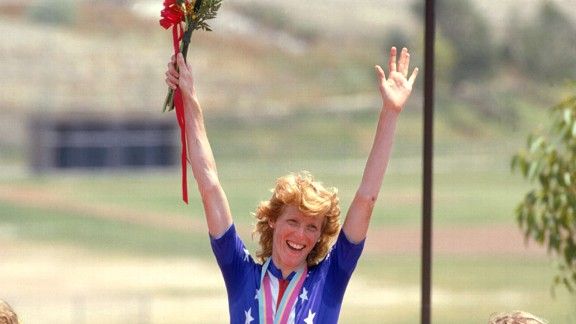
Born in 1957, Carpenter-Phinney spent her teens as an Olympic-caliber speed skater, cross-training on a bicycle, as many Upper Midwesterners did, until an ankle injury sent her into the cycling camp for good.
She emerged as an instant star in 1976 with the first of 12 national championships on road and track. Carpenter-Phinney was never an internationally dominant cyclist, but she was a perennial contender in an era when American cycling badly needed one, finishing second in the 1977 world-championship road race and third in 1981.
Carpenter trained for the 1984 Olympics by racing against the best American men. Her gold-medal ride in Los Angeles was a photo finish against fellow American Rebecca Twigg, whom Carpenter edged with a bike thrust at the line. As Isabel Best writes in the new women’s-cycling history “Queens of Pain,” “It was the moment the modern era of women’s cycling began.”
6. Rebecca Twigg
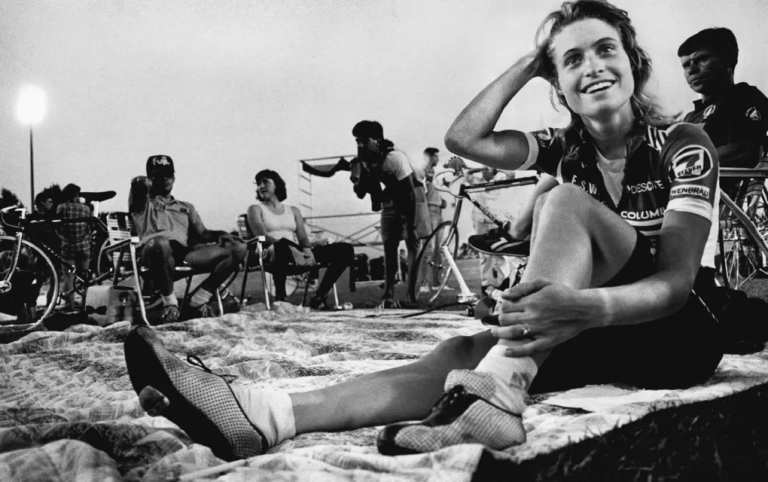
For an illustration of how little the world seems to regard women’s cyclists, especially American ones, take a look at the Wikipedia page for Rebecca Twigg. It spans three short paragraphs.
Twigg was, along with Connie Carpenter-Phinney, arguably the most successful among several American women who blazed a trail of glory across the cycling sport in the 1980s. Born in 1963, Twigg won an astonishing six world championships in the individual pursuit, her specialty. She also claimed 16 national titles and a silver medal in the 1984 Olympic road race, the one claimed by an older, wiser Connie Carpenter-Phinney. (An iconic photo captures the two women embracing and smiling just after the finish, the winner’s identity yet unknown.)
Raised in Seattle, Twigg was a prodigy who entered college at age 14. She eventually earned degrees in both biology and computer science. Her cycling career, like that of Van Moorsel, comprised two acts set off by a lengthy intermission. Twigg quit cycling at 26 and spent three years as a computer programmer before the 1992 Olympics lured her back.
Eddie Borysewicz, the great Polish-American coach, perhaps best expressed the exuberant energy that powered Rebecca Twigg at her best when he told Sports Illustrated, “She’s a lady who, if she likes, she can do.”
But Twigg’s story is another — and in this case, tragic — illustration of how little society rewards women’s cycling: She is back in Seattle now and, according to friends, homeless, and living out of a car.
Our list is short, and it skews towards more recent competitors. It’s unfortunate that we can’t point to a more comprehensive historical overview or database of women’s racing, but we hope that will change in the future.
This brief and anecdotal review does demonstrate the richness and legacy of women’s bike racing, and it implies a hopeful and optimistic future for this exciting but often under-reported, under-followed, and under-supported part of pro cycling.
